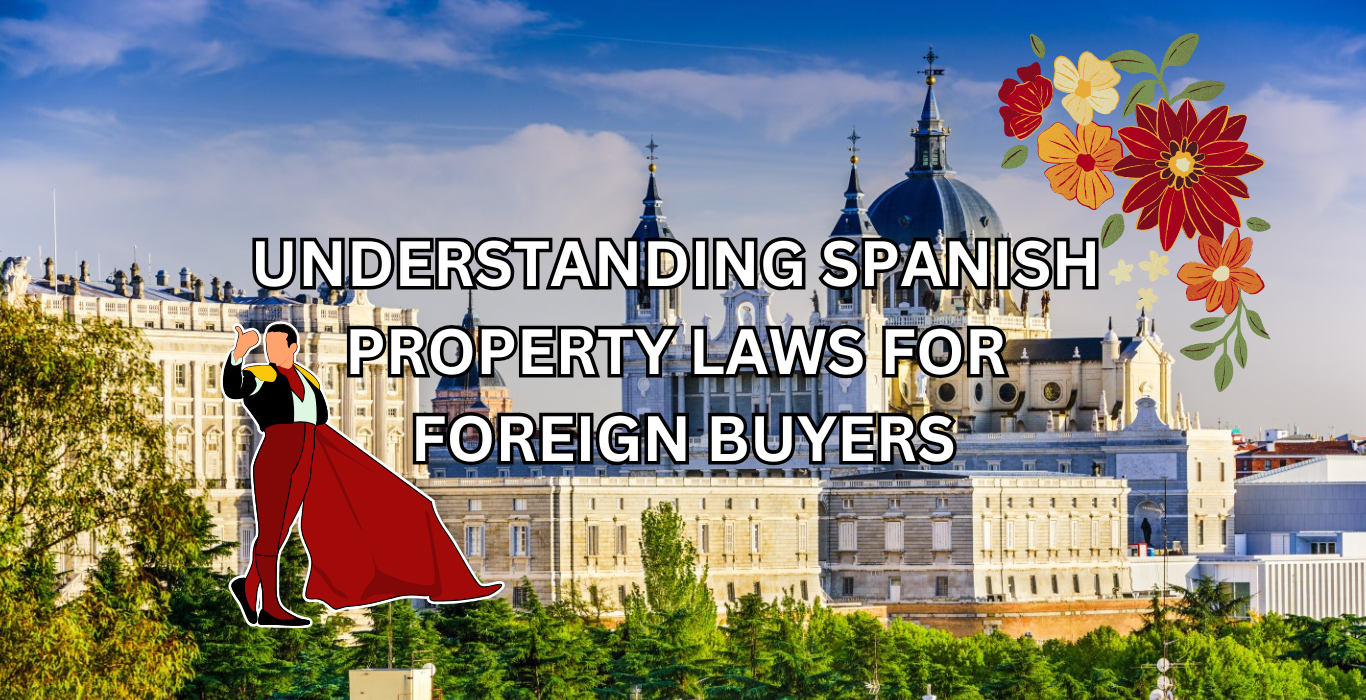UNDERSTANDING SPANISH
PROPERTY LAWS FOR
FOREIGN BUYERS
UNDERSTANDING SPANISH
PROPERTY LAWS FOR
FOREIGN BUYERS
Understanding Spanish Property Laws for Foreign Buyers
Spain is a popular destination for foreign property buyers due to its sunny climate, rich culture, stunning landscapes, and appealing lifestyle.
Whether you’re considering purchasing a second home, investing in real estate, or retiring, understanding the legal framework governing property ownership is crucial.
This guide outlines the main aspects of Spanish property laws for foreign buyers.
1. Can Foreigners Buy Property in Spain?
Yes, foreigners can buy property in Spain, and there are no significant restrictions on foreign ownership.
The process is nearly identical for both foreigners and Spanish citizens.
Residency in Spain is not required to purchase property. However, there are specific regulations and steps to ensure the legality and transparency of the transaction.
2. Types of Property Ownership in Spain
Foreign buyers can acquire various types of properties in Spain, such as:
Urban Properties: Apartments, houses, townhouses, and commercial buildings in cities and towns.
Rural Properties: Land, farms, and villas located in countryside areas.
Development Land: Plots for future construction, which require compliance with zoning laws, permits, and project approvals.
3. Foreigner Identification Number (NIE)
Before purchasing property, foreign buyers must obtain an NIE (Número de Identificación de Extranjero)—a tax identification number required for any financial or legal transactions in Spain, including property purchases.
You can obtain this number at a police station in Spain or a Spanish consulate in your home country.
4. The Buying Process for Foreign Nationals
While the property purchasing process in Spain is relatively straightforward, several legal steps are involved:
a. Finding the Property
Foreign buyers often work with real estate agents to find suitable properties.
Once a property is selected, an offer is made, often followed by a reservation contract (contrato de reserva).
This contract typically requires a deposit to hold the property while legal checks are carried out.
b. Legal Due Diligence
It’s essential to ensure the property is free of legal or financial issues, including:
Confirming the seller has valid ownership of the property.
Verifying that the property is free from debts, such as unpaid taxes or loans.
Ensuring the property complies with local building regulations.
A lawyer can help confirm these details.
c. Private Purchase Agreement
Once the checks are complete, the next step is to sign a private purchase agreement (contrato privado de compraventa), outlining the terms of the sale, including price, payment schedule, and other conditions.
At this stage, a deposit of 10% of the property value is typically required.
d. Notary and Public Deed
The final step is signing the public deed of sale (escritura pública de compraventa) before a notary.
This official document transfers ownership from the seller to the buyer.
The notary ensures the transaction’s legality and registers it in the Spanish Land Registry (Registro de la Propiedad).
5. Costs Associated with Property Purchase in Spain
When purchasing property in Spain, consider the following expenses:
Notary Fees: Usually 0.1%–0.5% of the property price.
Registration Fees: Charges for registering the property in the Land Registry.
Property Transfer Tax (ITP): Varies by region, typically 6%–10% of the property value.
Legal Fees: Lawyers usually charge about 1% of the property value.
Property Valuation Fees: Required if you’re applying for a mortgage.
6. Property Taxes in Spain
Foreign buyers must pay ongoing taxes related to their property in Spain, including:
Property Tax (IBI - Impuesto sobre Bienes Inmuebles): An annual local tax based on the property’s cadastral value.
Wealth Tax (Impuesto sobre el Patrimonio): Applies if the total value of your assets exceeds regional thresholds.
Capital Gains Tax: If you sell property at a profit, non-residents pay 19% tax on the gain.
Rental Income Tax: Rental income is taxed at 24% for non-residents, based on gross earnings.
7. Financing a Property Purchase in Spain
Foreign buyers can secure mortgages in Spain, though terms may differ from those for residents. Banks typically require higher down payments (30%–40% of the property’s value). Consulting a financial advisor is recommended to explore the best options.
8. Residency Through Property Ownership
Owning property in Spain doesn’t automatically grant residency but can provide pathways to obtain it:
Golden Visa: Non-EU citizens investing €500,000 or more in real estate can apply for a visa, granting residency and Schengen Zone travel privileges.
Non-Lucrative Visa: Non-EU nationals who purchase property and demonstrate sufficient income may qualify for a visa allowing them to live in Spain without working.
9. Inheritance Laws for Foreign Buyers
Spanish inheritance laws can be complex, particularly for foreign buyers.
The forced heirship rule mandates that a portion of your estate must go to children, a spouse, or close relatives, regardless of your will’s contents.
It’s essential to understand these rules when planning to pass on property to heirs.
10. Conclusion
Buying property in Spain is relatively straightforward for foreign buyers but requires attention to legal details, taxes, and local regulations.
Engaging a local lawyer, understanding associated costs, and adhering to all legal requirements ensure a smooth transaction.
Spain offers diverse properties, favorable climates, and excellent quality of life, making it an attractive investment destination.

